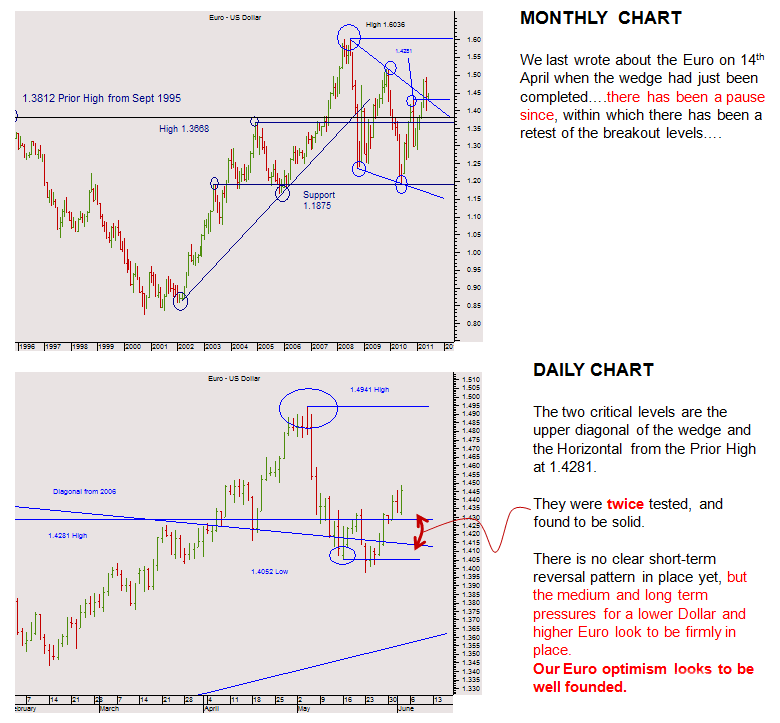U.S. Dollar Unable to Strengthen
Currencies / US Dollar Jun 03, 2011 - 05:44 AM GMTBy: Seven_Days_Ahead
 The Dollar’s recent rally appears over, or is it?
The Dollar’s recent rally appears over, or is it?
Until the start of May the Dollar had been under relentless selling pressure that drove it to within a whisker of 1.50 against the Euro. Then suddenly it corrected, very vigorously. The catalyst was a mix of events, but the Portuguese debt crisis was at the centre of the drama weakening the Euro.

FUNDAMENTALS:
The Dollar’s recent rally appears over, or is it?
Until the start of May the Dollar had been under relentless selling pressure that drove it to within a whisker of 1.50 against the Euro. Then suddenly it corrected, very vigorously. The catalyst was a mix of events, but the Portuguese debt crisis was at the centre of the drama weakening the Euro.
After a period of uncertainty the Portuguese government finally sought financial help from the EU/EZ/IMF and this seemed to bring the Euro zone’s debt crisis into sharp relief with Spain seen as the next victim.
Additionally, speculation had built that the ECB would follow up April’s rate hike with a move in May helped the Euro rally through April. But when the ECB left policy unchanged and Trichet failed to offer guidance on the next policy move, the Euro lost its support and the Dollar staged a lightning rally.
Switching to the Dollar, the US released a non-farm payroll report at the start of May that was better than expected and traders took this as a sign that the Labour market was at last repairing the damage caused during the Financial/crisis recession.
Moreover, the Dollar was back in favour as a safe-haven trade. The Chinese were concerned about controlling domestic inflation, Japan was still in the middle of her natural/nuclear disaster and the Sovereign debt in Europe crisis raged on. So questions were being asked about the sustainability of the global recovery, especially as oil prices had recently hit $115.00 and threatened to go higher.
But over the last few days the Dollar’s rally has run out of steam. What has changed?
The Euro zone Sovereign debt crisis if anything has deepened as Greece is once again in the spot light for all the wrong reasons: more financial assistance is required and the Euro zone authorities are working to arrange assistance.
But traders wonder if that is the answer. Greek debt has been downgraded to junk, and traders doubt that country as a nation has the will to see through the restructuring needed. A debt rescheduling is seen as a way out, but the Greek PM has said no, the markets now wonder if Greece will ultimately default or leave the Euro zone.
While all of these options are apparently not on the table, the Greek economy doesn’t seem able to cope with the prescribed medicine.
However the Euro doesn’t seem undermined by this as it has rallied over recent days, but in reality recent price movements in Dollar/Euro aren’t Euro zone driven, they derive now from the US.
The US housing market seems to be in a double dip recession as house prices have fallen back, erasing gains made since the depth of the recession. Other data releases over recent week’s have turn weak and that is despite the still very easy fiscal and monetary policy.
Worryingly the Feds QE2 program ends at the end of this month. What then for US growth?
So the Dollar is again under selling pressure because the US economy is again looking weak, only this week the PMI manufacturing survey unexpectedly weakened.
But that isn’t all that weighs on the Dollar. The Administration and Congress are still at loggerheads over the Government debt ceiling. The House Republicans refuse to vote through a debt ceiling extension, as they want to use it as a bargaining chip in negotiations with the White house over reducing the budget deficit. If agreement can not be reached the federal government will be forced to shut down.
In short, the US economy is again showing weakness.
Politicians cannot agree on how to tackle the Country’s growing debt mountain.
The Fed’s QE2 policy is near closure, and despite all of this, some policy makers at the Federal reserve are worried about inflation, even though the CPI and PPI readings are still mainly benign.
All is not well with the US economy and as the World’s largest economy, the woes of the US currently eclipse those of the Euro zone and are set to drive the Dollar lower.
Mark Sturdy
John Lewis
Seven Days Ahead
Be sure to sign up for and receive these articles automatically at Market Updates
Mark Sturdy, John Lewis & Philip Allwright, write exclusively for Seven Days Ahead a regulated financial advisor selling professional-level techni44cal and macro analysis and high-performing trade recommendations with detailed risk control for banks, hedge funds, and expert private investors around the world. Check out our subscriptions.
© 2011 Copyright Seven Days Ahead - All Rights Reserved
Disclaimer: The above is a matter of opinion provided for general information purposes only and is not intended as investment advice. Information and analysis above are derived from sources and utilising methods believed to be reliable, but we cannot accept responsibility for any losses you may incur as a result of this analysis. Individuals should consult with their personal financial advisors.
Seven Days Ahead Archive |
© 2005-2022 http://www.MarketOracle.co.uk - The Market Oracle is a FREE Daily Financial Markets Analysis & Forecasting online publication.



